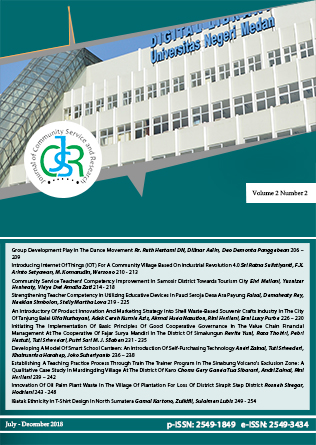DEVELOPING A MODEL OF SMART SCHOOL CANTEEN: AN INTRODUCTION OF SELF-PURCHASING TECHNOLOGY
DOI:
https://doi.org/10.24114/jcrs.v2i2.13156Abstract
AbstractIn general, the development of character building in a formal education can be applied through buying and selling transaction activities in the school canteen. The widespread use of computer technology can also be applied in trade activities in school canteens as an effort to establish the character of Indonesia's young generation with integrity and honesty. The introductory on the use of technology through a Self-Purchasing System or also commonly known as the Self-Check-out System is a mechanism that provides an opportunity for customers to process their purchases by scanning the items they buy and making direct payments before leaving the store/store. This technology can be initiated into religious and non-religious-based elementary schools that practice the values integrity and honest character from a specific religion to general values. However, even though these values have become a daily part of learning, the use of modern technology in the practice of education cannot be denied. Thus, the combination of pedagogy on the conceptual character-building value in the classroom and the use of science and technology in trading activities in the school canteen will accelerate the formation of integrity and honest character within the pupils.Keywords: Character Building, Self-Purchasing System, Governance, Smart School Canteen Model.Downloads
Published
2019-05-09
Issue
Section
Articles
License
Authors who publish with this journal agree to the following terms:
- Authors retain copyright and grant the journal right of first publication with the work simultaneously licensed under a Creative Commons Attribution License that allows others to share the work with an acknowledgment of the work's authorship and initial publication in this journal.
- Authors are able to enter into separate, additional contractual arrangements for the non-exclusive distribution of the journal's published version of the work (e.g., post it to an institutional repository or publish it in a book), with an acknowledgment of its initial publication in this journal.
- Authors are permitted and encouraged to post their work online (e.g., in institutional repositories or on their website) prior to and during the submission process, as it can lead to productive exchanges, as well as earlier and greater citation of published work (See The Effect of Open Access).
- This work is licensed under a Creative Commons Attribution-ShareAlike 4.0 International License.
This work is licensed under a Creative Commons Attribution-ShareAlike 4.0 International License.


